CIA Sponsored Terror, Civil Liberties, Criminalizing Dissent, FBI Intrusion, Habeas Corpus, Human Rights, Truth to Power
Podcast: Play in new window | Download
Updates:
- Chilean Judge Indicts US Military Official in 1973 Killings – CCR Case
- Newt Gingrich: “Water Boarding Is By Every Technical Rule, Not Torture.”
- Michael Ratner: S.1867 — National Defense Authorization Act for Fiscal Year 2012
—–
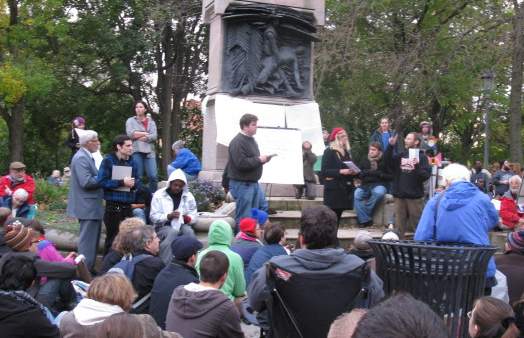
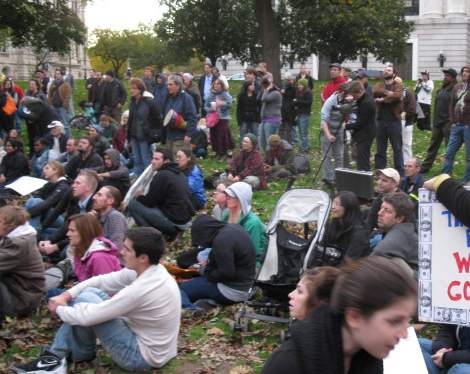
Occupy Albany: Undisturbed By City Officials
The collusion among mayors and police departments around the country to raid and take down Occupy Wall Street movements by force has revealed a particular hierarchy of control. However, as listeners may know there is a unique situation with the Occupy Wall St solidarity movement in Albany, New York. Despite the request of New York Governor Andrew Cuomo and Albany mayor to shut the encampment down at Academy Park, the police refused, then the State Troopers refused. In a memo obtained by the The Times Union, Albany Police Deputy Chief Steven Krofoff stated “At this time I have no intention of assigning officers to monitor, watch, videotape or influence any behavior that is conducted by our citizens peacefully demonstrating in Academy Park.
Attorney Mark Mishler:
- The Governor a few days before the occupation started met with the city of Albany office and as best as we can figure out at that meeting sort of all agreed that this wasn’t going to be permitted.
- It seemed to be permitted that people would not be able to stay past the 11PM curfew at the park.
- We have two very independent minded folks in law enforcement here.
- They took a different view. We have a District Attorney David Soares, who was independently elected as an opponent to the Albany County machine and with a lot of grassroots support.
- David Soares say he wasn’t interested in using his office to prosecute peaceful protesters.
- In correlation with that our police chief in the city of Albany, who also came into office as result from a grassroots movement for improved police / community relations. He also said he didn’t want to use the resources of his department to arrest peaceful protesters.
- The mayor who we believe really wanted to carry out the governor’s direction was really boxed into a corner and couldn’t do that.
- The park is really 2 parks, half of the park is city owned, the other half is state owned.
- We’re now in the sixth week, there are now about 50 tents.
- Essentially completely undisturbed by city officials.
Guest – Mark Mishler, attorney and National Lawyers Guild member.
————–
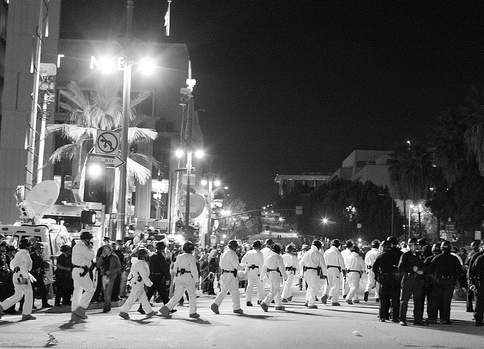
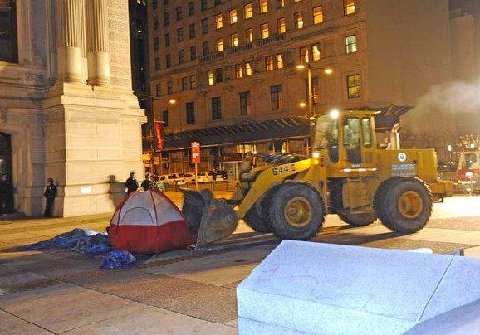
Occupy Los Angeles Legal Action
Occupy Los Angeles and Occupy Philadelphia were among the encampments forcibly removed last week. Occupy LA demonstrators had expected to be evicted after the mayor announced that the park would be closed at 12:01 a.m. on Monday last week. Late the following night, police in riot gear stormed the encampment and dozens were arrested as protesters chanted and stood defiant through the raid. The more than 500 tents have been taken down. The encampment at Philadelphia’s Occupy Wall Street movement was also raided after demonstrators marched to protest their eviction. Up to 40 protesters were arrested.
Hours after the Occupy Los Angeles eviction deadline protesters filed for a federal injunction that would prevent the police from dismantling the occupation in Oakland Park. The city, mayor and chief of police are named in the lawsuit as defendants. The complaint also says the city engaged in “arbitrary and capricious action in violation of the 1st and 14 Amendments by first approving the Occupy presence for 56 days before suddenly revoking permission through the unilateral action of defendants.
Attorney Carol Sobel:
- We filed papers, we argued that the mayor’s actions were unlawful because the City Council of Los Angeles passed a resolution saying that they could stay there.
- The Council, only the Council has the authority to do that.
- Once that Council acts, he could veto it, he chose not to at the time, back in October, or he could get it rescinded. He chose not to.
- Our position is, the Mayor can’t make up the rules as he goes along.
- This is a public forum, we’ve had anti-war marches here, marches to protest the Pope when he came.
- The mayor used to be friend. The Mayor went to the same Guild law school that I did.
- I think that the Mayor is bought and paid for by the developers in Los Angeles. Somebody said to me last night, he’s lost his soul.
- He’s not progressive by any definition of that term. He is the head of the US Conference of Mayors.
- It looks bad for him I guess to have the largest Occupy in the country, in his city, at his doorstep.
- They (LAPD) have agreed that they will not come out with a show of force, unless and until it’s needed.
- If you can’t close the park after the fact, then these arrests were all unlawful.
Guest – Civil rights attorney Carol Sobel, a legal advisor for Occupy protests across the country. Carol Sobel is listed as the attorney on the new complaint.
—
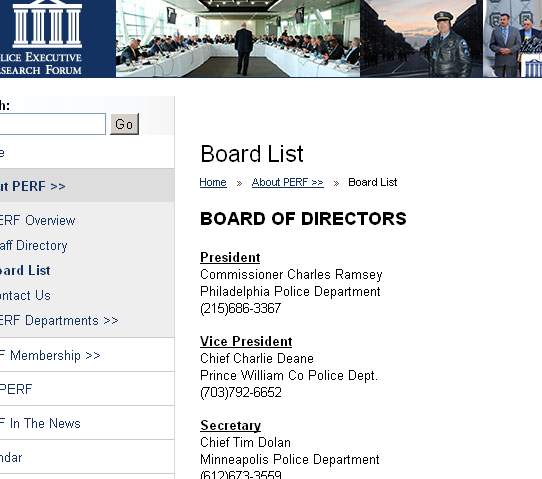
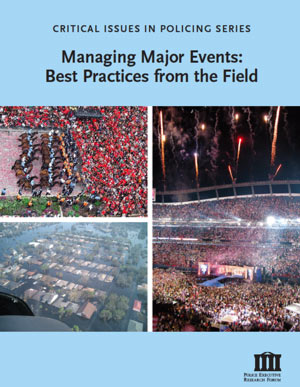
Collusion in the Defense of the 1% is No Vice
As mayors of cities across the country colluded to crackdown on the OWS encampments, an international non-governmental organization had coordinated with police chiefs and mayors behind the scenes. The group is called the Police Executive Research Forum, it is an influential private membership based organization that is marketed to heads of major metropolitan areas as specialists with mass demonstrations. The group has ties to the US Department of Homeland Security and their general membership in the group is exclusive to former executives leading a state or county funded agency that provided police services.
Geov Parrish:
- The Occupy Seattle movement is community college property.
- The community college let them stay there but at first it was a public square and it was a cat and mouse game with the police.
- From November 4-10, there were conference calls. Much of the local media coverage was very coordinated.
- This smacks of the operations of some of the high ranking people the PERF has been associated with.
- The PERF actually does research on less then lethal weaponry, such as the pepper spray that has been used in lots of different cities.
- Charles Ramsey, Philadelphia Police Commissioner and the chair of PERF’s board of directors is also on the Homeland Security Advisory Council as are a couple of other board members from PERF.
- There’s an entire industry that has sprung up around the militarization of the police forces. The routine use of SWAT teams now for even non threatening situations.
Guest – Geov Parrish, a Seattle-based columnist and reporter. He writes the Straight Shot column for WorkingForChange. Parrish also wrote the article Collusion in the Defense of the 1% is No Vice.
——————————————
Civil Liberties, Criminalizing Dissent, Habeas Corpus, Human Rights, Surveillance, Truth to Power
Podcast: Play in new window | Download
Updates:
- What Does OWS Mean? – Michael Steven Smith
- Liberty Square Symbolic, At The Foot Of Capitalism
- Redistribution of Money and Power
- Nationally Coordinated Bust: Oakland Mayor Says She Was On Conference Call With 18 Mayors
- Michael Smith’s Story Of Liberty Square Police Raid
- NYTimes Candid With Spoils Of Libya Invasion
- Who Killed Che? How The CIA Got Away With Murder
—
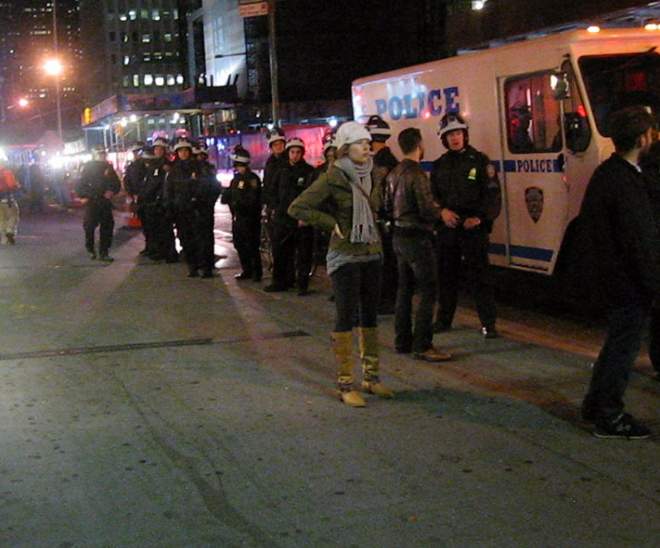
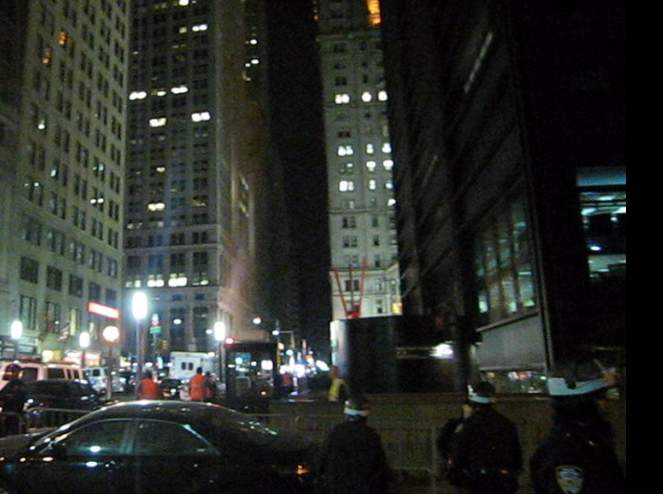
Legal Fallout From OWS Raid In New York City
Very early last Tuesday morning, teams of New York City Police in full riot gear descended upon the 2 acre park known by protesters as Liberty Square, home of Occupy Wall Street. Hundreds were arrested as police and bulldozers dismantled and tore down tents, confiscated gear, computers and clothes. Plain clothes construction workers assisted in filling large dump trucks with personal belongings and equipment from the encampment. The massive eviction is one of many reported across the country in past weeks.
Attorney Danny Alterman:
- There’s been a core group of 20 or 30 people working on issues that effect the occupiers down on Wall Street.
- We talked strategy, we created a document that would decide and get us into court in the morning.
- We are arranged to meet Judge Billings at 6AM
- We wanted to judge to issue a temporary restraining order which means that the police could not continue to evict people and order them back into the park with their belongings.
- We got a signed order from the judge to let our clients back in.
- We served Brookfield Properties which is the owner of the park, the city of New York through the corporation council, and the police department by fax with a copy of the order.
- What this reminded me of is was what had happened precisely in 1971 when the Attica Massacre happened. When we got a court order to go in because people were dying and getting shot, inside and the prison authorities refused to open up for medics and lawyers, causing the death of other people.
- Finally I said to one guy who was getting on me and getting on another lawyer that was there. I said listen, this reminds me of Attica, he said I’ve never been to Attica, I said we can make those arrangements.
- I said, you realize you’re violating a court order, and in contempt of court.
- Mayor Bloomberg in the course of us getting an order and finding out about it, had decided to close the park, which was the complete opposite of what the court said which was to re-open the park.
- Homeland Security was definitely there, you can tell by the crew cuts and the shoes.
- There was a temporary restraining order issued at 6:30 AM. We didn’t think Judge Billings would stay on the case. She didn’t. We went back at 11:30AM, and once a judge was assigned had about a 2 hour argument.
- We received papers as we walked into court from the city which contained a affidavit which is a legal document swearing to issues of public safety, health issues, other kinds of issues, that was clearly prepared before they evicted the protesters 10 hours before.
- What this means is that the city knew in preparing these papers that there was going to be a legal challenge.
- Brookfield Properties a descendant from US Steel. This is direct descendant from US Steel.
- We may be looking at 21st century speech assembling petitioning.
- Its a privilege and an honor to represent these people and I think the people have the pulse of the country and its happening.
Guest – Civil rights attorney Danny Alterman, Danny is part of the Liberty Park Legal Working Group.
———–
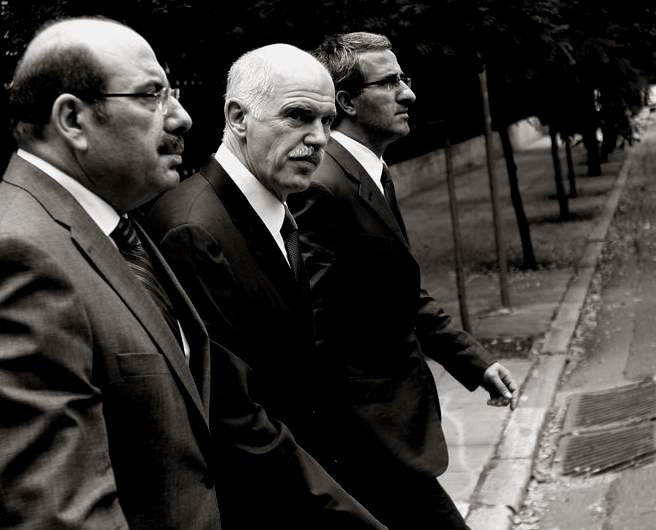
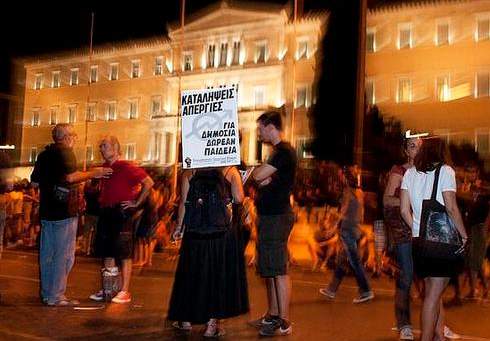
Global Capitalist Crisis and Long Term US Unemployment
Thousands around the country continue to stand in solidarity with the Occupy Wall Street movement. The movement claims to defend the 99 percent of Americans against the wealthiest 1 percent who control 50 percent of the wealth in the United States. Meanwhile, long term US unemployment is taking a heavy toll socially. The social costs are high, the stress, tension and anxiety within families, the costs of counseling, and much more. We discuss these topics with returning guest, economics professor Rick Wolff who says, enormous wealth could be produced right now with the unused tools and raw materials put together with the nation’s unemployed people, we could rebuild our cities and infrastructure.
Professor Rick Wolff:
- Debt is always a sign of something else. You go into debt because you see a need or opportunity for which you don’t have the money and so you either forego the need or opportunity or borrow.
- If you see off the chart increases of debt like you do in the case of individuals in the last 30 years, or corporations and in the case of governments at a slow rate over the last 30 years, then you have to ask the question why?
- The 1970s come along and that period of 150 years of rising wages is over. It’s over because the computer replaces large numbers of people they don’t need to be hired. Production is moving out of the United States.
- Immigrants are flowing into the United States because the uneven development of the world economy, makes them poorer and the United States look more attractive.
- Suddenly employers have the greatest of all possibilities, they don’t have to raise wages anymore.
- Employers: If you’re not happy here, there’s a lot of other people that will be.
- Meanwhile you’re drumming into the American people, you should live better, everybody should have more. . .
- You put the American people into an impossible situation. You might have been able to handle it by having a real political leadership in America. We didn’t have that conversation, no politician wanted to be the bearer of that bad news.
- What can the American people do? They did more work. You borrow money. Whenever there’s a debt, there’s a lender and a borrower. This is a strange game to blame the borrower.
- Greece, now you have a situation that invites all kinds of corporations to make a decision.
- When the Greek Drachma, their old currency disappears to be replaced by the Euro, all kinds of business decisions became different.
- There was no border, you couldn’t have a tariff as you could before. Once you have a uniform currency you can’t do that. It’s like Tennessee erecting a tariff against products from Kentucky.
- Who lent to the Greek government? Above all, the French and German banks.
- It’s the banks that are making money because of the concentration of production in their country, with which they came to the poor countries and said hey, we got a lot of money you got a lot of need.
- A lot of money has been made off of Greek debt. It’s not some gift to the folks in Greece.
- As usual its a partnership and deciding that its all the fault of the Greeks as if the French and German banks didn’t make a fortune off of this.
- Italy is now where Greece was approximately six to eight months ago.
- The debt of Italy is four to five times the debt of Greece. Italy is the eight largest economy on this planet. They have over 2 trillion dollars of debt outstanding. We sell a very important part of our output to the Europeans.
- I would demand now, an immediate government employment program. A commitment by the United States government.
Guest – Richard D. Wolff is Professor of Economics Emeritus, University of Massachusetts, Amherst where he taught economics from 1973 to 2008. He is currently a Visiting Professor in the Graduate Program in International Affairs of the New School University, New York City. He also teaches classes regularly at the Brecht Forum in Manhattan.
————————
Civil Liberties, Criminalizing Dissent, Habeas Corpus, Human Rights, Truth to Power, War Resister
Podcast: Play in new window | Download
Updates:
—-
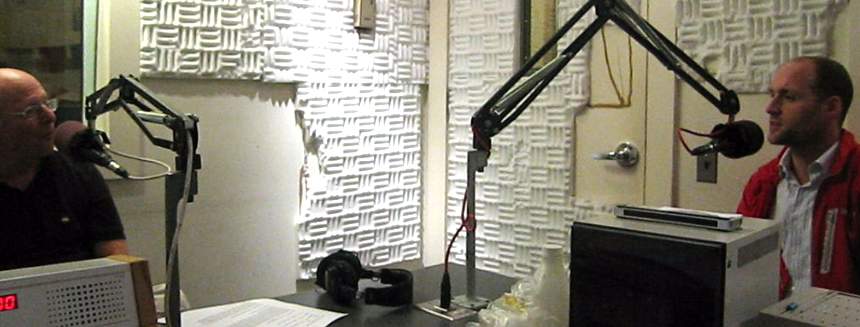
Occupy Wall St. – Think Tanks and Organizing
Like many protesters down at Liberty Plaza, Tim Weldon has been under employed for years. He’s got a Masters Degree, one in economic development and 10 years experience in international business. He’s now part of Occupy Wall St working with the think tank group. The first step is taking all the ideas and solutions generated from the movement and collating them into a more accessible format.
Tim Weldon:
- The food is hit or miss, you cycle through, get in line, whatever is there at the time, that’s what you get.
- There’s sanitation, first aid, media press, PR. The group that I’m specifically on is the think tank.
- Similar to a lot of people, said, how do I fit in and what exactly is going on? Like most people I got down there and thought how do I fit in to where I most belong? So, I walked around for most of the day, I got to the stage to where I thought, what I would be good at and what could fit in here.
- Then I found some very like minded people who were thinking the same thing, to sort of create an opportunity for all of the ideas to be collected, organized and collated together. The think tank, we’re going to have four different receptacles for information.
- One will be from the park where we’ll have discussion groups on topics. We’re trying to develop a web platform within the NYCGA.net .
- We’re getting all walks of life, one of the best participants was a disabled man.
- The discussions have been so positive and energetic and we’re saying how can we take both of these ideas and forget about the established dichotomies and all this dogma that people are working with.
- Let’s go straight to us right here, let’s create a productive use of this information where everybody is happy.
- I found that everybody I’m working with open and wants to listen, wants to learn, the way most of the groups work is there’s no leaders. I like to draw differentiation between leaders and leadership.
- People are coming here after they’ve been setup and more streamline or coming here to get things more streamline. Take a step back, try to envision something different.
- Everybody seemed united around, well, they want it clean, lets get things clean.
- People were doing what had to be done and getting things done, but there was a subtle apprehension there, what’s going to happen tomorrow? How serious is it going to be? How much are we going to have to fight, not in a physical sense but in all sort of senses for this space?
- Most of the country can get behind the fact, whether your left or right, whatever it is, you’ve got some apprehension about what’s going on in the country right now and that’s what we’re trying to voice.
- Holding that space is really important to the movement.
- Maintaining that park is very important because it is the symbol. You control us in every other aspect of our lives perhaps, but you don’t control us here.
- I left my job last week, this to me is the movement of our generation.
Guest – Tim Weldon is from upstate New York. He quit his job to dedicate his time to help the Occupy Wall Street movement. Specifically, Tim is working with the think tank group, pulling together ideas and solutions pouring in from around the country and making them more accessible to media and others. Tim has a Master’s Degrees in economic development. He also has 10 years experience in international business.
—
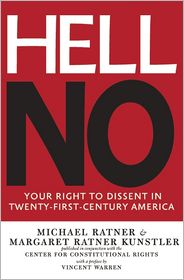
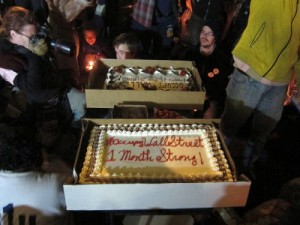
Occupy Wall Street: Attorney Margaret Ratner-Kunstler Part 2
We continue the “know your rights” discussion on the Occupy Wall St protests, encampments and demonstrations. Last week we talked about how the NYPD collected intelligence data from protesters. When more than 800 people on the Brooklyn Bridge were arrested a few weeks ago, that event was more about getting protester names and pedigree information into databases says attorney Margaret Ratner-Kunstler with the National Lawyers Guild. Meanwhile students from 90 colleges and universities are protesting the price of education, being saddled with student loan debt and more. There are many aspects to knowing your rights as a demonstrator and we’ll discuss more details today with returning guest attorney Margaret Ratner Kunstler.
Attorney Margaret Ratner-Kunslter:
- You can be anywhere to express your first amendment rights. I think occupation is a new first amendment right.
- The occupation movement is relatively new and we haven’t really tested it in the federal courts or state courts and I think we have a good opportunity to do that. They haven’t got people out of the park because when they threatened to do so, the number of people swelled from about 1000 to 6000.
- I think it was a question of mass support for the demonstration that prevented the police from clearing the park.
- Seattle was a successful protest (1999) it interfered with delegates going to the convention center and it was a very embarrassing thing for the police because it was an international conference.
- Kettling is those big iron fences, they put people in these fenced areas to keep them separated so they can be crowd control.
- By the time Michael and I finished this book, we were saying, oh, they’re never going to be able to demonstrate again. But lo and behold, a new form of demonstrations is upon us, and its just thrilling.
- The police officer who pepper sprayed the young woman, lost ten vacation days.
- That was the immediate result after Seattle, there were fusion centers. Those are centers where the FBI and local police get together and collect information.
- Every time they hear of a demonstration, they try to prevent it, they have many ways to dissuade people from coming to demonstrations.
- Militarization of the police: It was no longer a family occupation to protest against the war, it was a dangerous thing to do. You got stuck in a pen and you couldn’t get out.
Guest – Magaret Ratner-Kunstler, an attorney in private practice. As education director at the Center for Constitutional Rights, she originated the Movement Support Network and authored “If an Agent Knocks.” Margaret is the President of the William Moses Kunstler Fund for Racial Justice, a foundation established in 1995 in the memory of her late husband to combat racism in the criminal justice system.
——————————-
Civil Liberties, Criminalizing Dissent, FBI Intrusion, Green Scare, Habeas Corpus, Human Rights, Surveillance, Truth to Power, War Resister
Podcast: Play in new window | Download
Updates:
—-
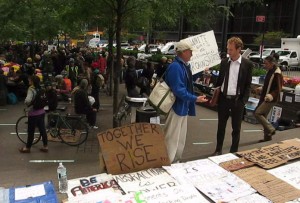
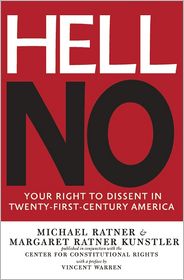
Occupy Wall Street: Attorney Margaret Ratner-Kunstler
There is a North America-wide strategy to take away the right to mass protest. We’ve talked about the book Hell No: Your Right To Dissent in 21 Century America, but today we have both authors of this book in the studio, attorney Magaret Ratner Kunstler and our own co-host Michael Ratner.
In Hell No, the Center for Constitutional Rights, the country’s leading public interest law organization, offers a timely report on government attacks on dissent and protest in the United States, along with a readable and essential guide for activists, teachers, grandmothers, and anyone else who wants to oppose government policies and actions. Hell No explores the current situation of attacks upon and criminalization of dissent and protest, from the surveillance of activists to the disruption of demonstrations, from the labeling of protestors as “terrorists,” to the jailing of those the government claims are giving “material support” to its perceived enemies. Offering detailed, hands-on advice on everything from “Sneak and Peak” searches to “Can the Government Monitor My Text Messages?” and what to do “If an Agent Knocks,” Hell No lays out several key responses that every person should know in order to protect themselves from government surveillance and interference with their rights.
Attorney Margaret Ratner-Kunslter:
- This is a time that we don’t know the return dates are because they weren’t put throught the system, they were given desk appearance tickets or summons, people arrested on the Brooklyn Bridge and elsewhere.
- Politically what do you make of the fact that they let these people stay in the park? Perhaps Michael they had an opportunity to do something about it if they did something quickly.
- In Boston, they closed it down much more quickly. Each Lawyers Guild office has a hotline.
- They (the NYPD) actually led people down to the bridge walkway. There’s a law in New York that says you can’t block roadways, but you can march on sidewalks.
- They led people down to the roadway, then announced with a bull horn that not everybody could hear of the more than 800 people on the bridge – – you’re now doing something illegally and we’re going to disperse immediately or we’re going to arrest you. Most people were chanting, nobody could hear that announcement.
- Why do this? There was no place to put these 800 people. To get their names, to get their pedigree information, to do intelligence work.
- Early on with the RNC arrests, they had a sheet of paper asking what political affiliations they had. We stopped that quickly. The police department in New York City has a tremendous intelligence division.
- Some people we have no idea why they were arrested.
- Yesterday morning a young woman was chalking on the sidewalk, “good morning NYPD.” Not only was she arrested, but the people photographing her arrest, were arrested.
- Much of the planning on how to stop demonstrators, happened after Seattle 1999. At that point there was this training program that began with all of these local police forces across the country and the FBI. It wasn’t til 9/11 that they were fully funded.
- When Michael Ratner and I wrote this, we were totally depressed because we thought that demonstrations were over. There were so many ways of preventing demonstrations and people were penned.
- You can film the police in NYC. The law may be on your side, but the police don’t follow the law.
- If you’re recording audio, and only one party knows you’re recording, that’s ok in New York.
- The cop doesn’t have to give you his name, or badge number. If you ask a cop his badge number, he’ll give you the wrong number.
- I’d like to last through winter, I’m worried about these children. The demand for justice and equality is the demand basically all over the world.
- How can we say this is too abstract for us, isn’t this what we all want?
Guest – Magaret Ratner-Kunstler, an attorney in private practice. As education director at the Center for Constitutional Rights, she originated the Movement Support Network and authored “If an Agent Knocks.” Margaret is the President of the William Moses Kunstler Fund for Racial Justice, a foundation established in 1995 in the memory of her late husband to combat racism in the criminal justice system.
———
Civil Liberties, Habeas Corpus, Human Rights, Prosecution of the Bush Administration, Surveillance, Torture, Truth to Power
Podcast: Play in new window | Download
Updates:
—
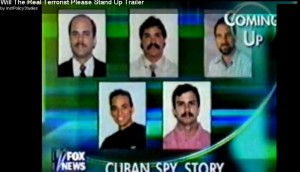
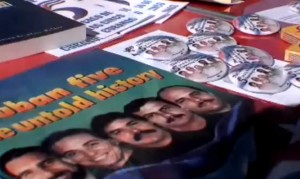
Saul Landau – Will the Real Terrorist Please Stand Up
We welcome back internationally known scholar and film maker, Saul Landau. We talk with Saul about his recent article, A Judge Grants Dubious Probation and his film, Will the Real Terrorist Please Stand Up? In his article, Saul writes about the release of Cuban Five member Rene Gonzalez who was released on parole in Miami for 3 years. Miami isn’t a good place for an admitted Cuban agent, Saul writes, and he’s a man who infiltrated the anti-Castro Brothers to the Rescue; his life would be in danger from Cuban exile terrorist groups. Earlier this year, Gonzalez had asked the court to allow him to return to Cuba where his family lives. As many listeners may remember the Cuban Five are five Cuban men who are in U.S. prison, serving four life sentences and 75 years collectively after being wrongly convicted in U.S. federal court. They were accused of committing espionage conspiracy against the United States.
Saul Landau:
- The classification of terrorist fall into 3 categories. The good, the bad and the crazy.
- The good terrorists are freedom fighters. Those are people still walking around Miami because they’ve directed their violence against Cuba, who is a bad guy.
- Then there are the bad terrorists and of course they’re all Muslims. Then there are the other terrorists who are neither good or bad, simply crazy like the guy who did the Oklahoma City bombing and this Norwegian guy who did this massacre.
- The idea in the film “Will The Real Terrorist Please Stand Up” is that people don’t know what the Cuban Revolution was and they don’t much about US policy. Ironically, Cuba is now showing this film in their high schools having found out their own students are ignorant about their own history.
- Cuba had very little recourse over terrorism for decades, other than to infiltrate the groups that were planning violence against Cuba and try therefore to impede their terrorist actions.
- The Cuban Five were looking for information that would help them stop bombings in Cuba.
- They were spying on Cuban exile groups that were based in south Florida.
- When the Soviets went away in 1991, Cuba had very little recourse in terms of economic survival other than tourism. As she began to get her tourism revved up, so to did the Cuban exiles in Miami start to level their guns; deterring tourists from going.
- Posada Carriles: We have interviews of him in the film, and of course he denies he did any of it in the New York Times.
- He gets honored, he got the keys to Hialeah, Florida for doing things he denies he has done. If he hasn’t done all these things, why would they honor him?
- Posada Carriles and Orlando Bosch hired two Venezuelans to plant bombs in an airplane bathroom, which would go off after the two bombers left the plane.
- The Venezuelans confessed they were hired by Posada and Orlando. The Venezuelan police arrested them. They both got out for weird reasons. Posada escaped with the help of a 50 thousand dollar bribe to the warden of the prison.
- When Posada got out he went to work for Col. Oliver North. His next job was financed by the Cuban American National Foundation, which was the heart of the anti-Castro lobby. Orlando Bosch died after getting honored at the University of Miami. Orlando Bosch was pardoned by George HW Bush.
- Rene Gonzales: Essentially she’s put a bulls eye on his chest.
- After the United States assassinates a U.S. citizen abroad because it is said he planning terrorist acts against the United States. Under that precedent would Cuba not have the same right to send assassins into Miami and gun a whole bunch of people who are Cuban citizens in the United States who are plotting against Cuba?
- People can screen the film at CinemaLibreStudio.com
Guest – Saul Landau, a senior fellow at the Institute for Policy Studies at the Berkeley Graduate School of Journalism, has produced more than 40 films in his career, most concerned with human rights. His latest documents 50 years of US-Cuba relations in which violent Cuban exiles–backed by the CIA–tried to dislodge Cuba’s government, and of five Cuban spies, now in US prisons, who tried to stop this US-sponsored terrorism.
——-
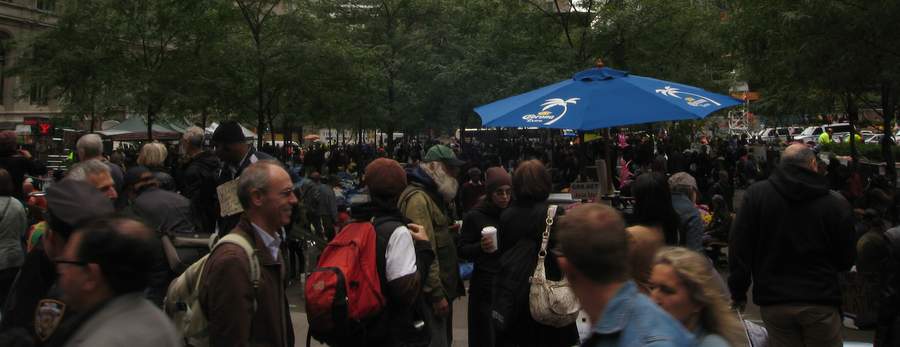
Occupy Wall Street: Liberty Square, New York City
We go now to hear a wide range of voices from One Liberty Plaza at the Occupy Wall Street encampment. During these interviews, the Occupy Wall Street movement remained a collective with people of many political persuasions. In this early period of austerity measures, they call themselves the 99% that will no longer tolerate the greed and corruption of the 1% and claim they’re using the revolutionary Arab Spring strategy to achieve results and encourage the use of nonviolence and civil disobedience.
Our own Heidi Boghosian spoke with activists, union workers, a lawyer and many more about where the movement is going, the support for it and a focus on demands such as pushing for the redistribution of wealth from the top 1 percent of Americans.
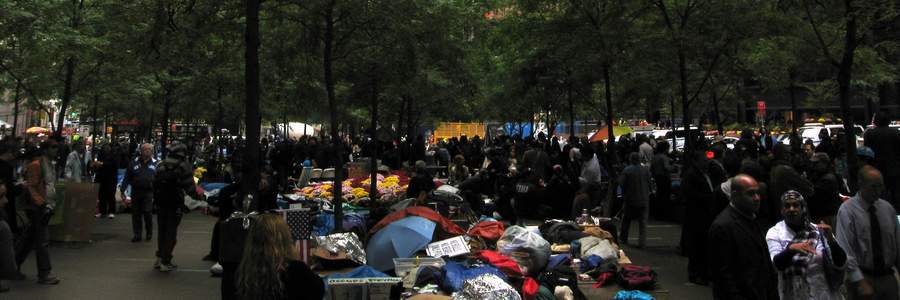
Afghanistan War, CIA Sponsored Terror, Civil Liberties, Criminalizing Dissent, FBI Intrusion, Green Scare, Guantanamo, Habeas Corpus, Human Rights, Surveillance, Targeting Muslims, Torture, Truth to Power
Podcast: Play in new window | Download
Updates:
—
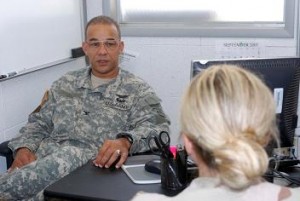
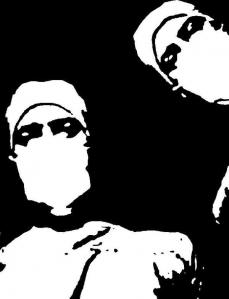
Medical Professionals Complicit In US Torture Policy
As many listeners know, health professionals were front and center and complicit in the US policy of torture. The torturers relied heavily on medical opinion. Medical professionals provided sanitizing and rationalization for the infamous torture memos. During water boarding procedures, a doctor would be present. Psychologists were directly involved in the supervision, design and execution of torture at US military and intelligence facilities. This is a violation of state laws and professional ethics. These “health professionals” that were involved with torture still hold their professional licenses to practice. Meanwhile a legal battle continues against the Louisiana Psychology Board for refusing to investigate professional misconduct allegations against Dr. Larry James. He’s a retired US Army Colonel and high ranking adviser on interrogations for the US military in Guantanamo Bay.
We talk more about this case and the breach of ethics in the medical profession since 9/11 with Dr. Stephen Soldz, former president of Psychologists for Social Responsibility. Stephen is a psychologist, psychoanalyst and public health researcher in Boston, he is also co-author of PHR’s report in Experiments in Torture.
Stephen Soldz :
- Psychologists played a central role, there were 2 professions, one was lawyers, the other less well known was psychologists. It turns out that it was psychologists that designed and implemented, the enhanced interrogation torture program, who monitored it, who trained others in it and who researched it and provided all the legal protection.
- It’s believed that it was psychologist James Mitchell who was present there, who was in charge.
- There’s the CIA program that was for so called high value detainees in CIA custody in various secret prisons called black sites. This is where the psychologists were central, they designed the whole thing.
- There was a black site at Guantanamo where a few people were held at various points.
- Guantanamo was technically under the military control, not CIA control.
- The CIA: like I said the psychologists designed this stuff, it was quite brutal. Forcing people to stand, shackling them up, with their arms out, naked in cold air. For 7 days at a time.
- Being forced to stand day after day is extraordinarily painful. Think about having to do that without using the toilet, with liquid food being forced into you. They at times used small boxes where a person could neither stand or sit.
- The boxes were banged on at times, they would throw people against walls, with special devices around their neck supposedly to protect them from permanent damage. There were various slaps that were authorized.
- The American Psychology Association has an ethics code and its binding on all members. Not all psychologists are members, but all the states base their own ethics code for licensed psychologists upon that of the APA, some mandate it exactly some adopt their own.
- The CIA and military insist that the psychologists that do this stuff be licensed by the state.
- Many of them are APA, so the APA ethics are intimately involved here.
- The APA equivocated and formed a task force. They said that psychologists had an obligation to keep interrogations, safe legal and effective. This language it turns out was taken from the Bush torture memos at the Justice Department. The task force was dominated by the military.
- They claim to be resolutely against torture, they make statement after statement. Psychologists shouldn’t be safety officers.
- In all 3 states, lawyers have joined my colleagues to force the APA board to do their job. The board doesn’t have the leeway to dismiss claims of torture without clearly investigating them.
- Larry James was a Biscuit 1 and later served at Abu Ghraib after the scandals there, he claims to have been the person who cleaned it up.
- He admits that he observed abuse by other people and didn’t report it to the commanders.
- He’s now out of the military and the Dean of the School of Psychology at Wright State University in Ohio.
- It’s rather sad, instead investigating what did or did not happen, they attack those who raise issues about Colonel James.
- Physicians For Human Rights / When Healers Harm
Guest – former President of Psychologists for Social Responsibility, Stephen Soldz is a psychologist, psychoanalyst, and public health researcher in Boston, and was a co-author of PHR’s report Experiments in Torture. He is the Director of the Center for Research, Evaluation, and Program Development at the Boston Graduate School of Psychoanalysis. He was Adjunct Assistant Professor of Psychology (Psychiatry) at Harvard Medical School, and has taught at the University of Massachusetts Boston, Boston College, and Boston University.
——–

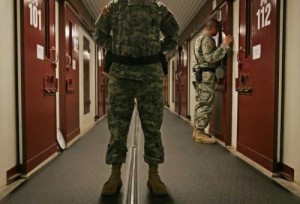
Guantanamo Bay and Offshore Prisons
The Obama Administration has allowed the Bush policy to continue allowing for the practice of torture, rendition and secret prisons to continue. We talk about the ongoing practice of torture, secret sites and Guantanamo Bay. There are 3 groups at Guantanamo, the first is 2 dozen that are genuinely Al Qaeda. The second group shouldn’t have been there in first place, around 200 of them will be sent home. The third group are refugees who are from countries with horrible human rights records.
Attorney Vince Warren:
- What role do the people play in order to stop this? (wars) We are at war to make war is what the public has bought into. By using the war paradigm, the president seized power that belonged to Congress, seized power that belonged to the Courts and seized power that belonged to the people.
- You can’t be at war with the “concept” of terror.
- Prior to 9-11 when terrorism would happen. There was an investigation, an indictment, prosecution and if there was a case, they were to be convicted.
- As of 2011, more people in Guantanamo have died than have been referred for criminal charges.
- We shouldn’t fool ourselves into thinking that this was a genuine reaction to a tragic event.
- This aggressive war(s) that are based on lies, without any legitimate security threat, is a crime.
- The other piece since 9-11 is the interesting double speak. Torture and aggressive war become justifications since 9-11.
- The Bush Justice Department said that the law simply does not just apply to the President, when he’s acting as Commander In Chief. It doesn’t matter if Congress passed a law that we expect the President to be bound, the Justice Department said he could ignore it if it didn’t fit in to what he wanted to do.
- That led to the Bush lawyers counseling him that he could ignore a law that said torture was illegal or could ignore a law that says the government can’t wiretap without a warrant.
- President Obama talked very big about ending torture and about ending these policies.
- What is happening now in the United States is that local police forces, immigration forces, private contractors are colluding and conspiring to infiltrate political movements and largely peaceful political movements.
- – in order to “uproot the terrorist.”
- Course there are no terrorists there, what there are are people who have a very vibrant and credible claim.
- Myself and a number of other human rights people went to a meeting with President Obama in May 2009. I was shocked at how President Obama completely understood the legal issues we were raising.
- The very next day he essentially came out with a preventive detention scheme. An indefinite detention scheme in Guantanamo.
- What really troubled me is that he knows. He knows precisely what the right thing to do is.
- This thing is not going to fix itself. CCR Facebook – Twitter @theCCR
Guest – Attorney Vince Warren, Executive Director of the Center for Constitutional Rights, a national legal and educational organization dedicated to advancing and defending the rights guaranteed by the United States Constitution and the Universal Declaration of Human Rights. Vince oversees CCR’s groundbreaking litigation and advocacy work which includes using international and domestic law to hold corporations and government officials accountable for human rights abuses; challenging racial, gender and LGBT injustice; and combating the illegal expansion of U.S. presidential power and policies such as illegal detention at Guantanamo, rendition and torture.
—————————————-






















